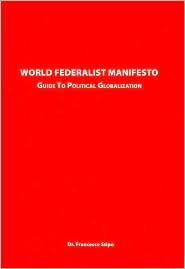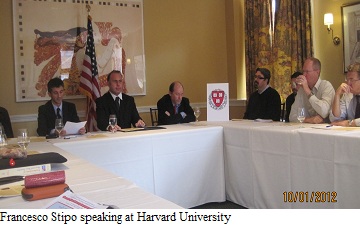History of Modern
Globalization and Background of World Federalism
Ancient globalization differs from modern globalization in
that the first was designed to conquest lands and was carried out by military
invasion, while the second is geared toward the expansion of commerce and its
instrument is the international agreement.
Political globalization is the creation of a system of global governance that regulates
relationships among nations and guarantees the rights arising from social and
economic globalization.
The International
Legislative Branch
The creation of the United Nations was characterized by an
error at its source: every nation was given one vote in the Assembly. This way,
a nation with thirteen thousand inhabitants has the same voting power of a
nation with three hundred million. Such an inequality induced the initial
members of the United Nations to find an artificial remedy to the original
error, subordinating the most important decisions to the approval of the
Security Council, a body composed of five permanent Member States, each one with
veto power.
The author introduces the idea of dividing the General Assembly
into two different chambers, applying a bicameral system to the United Nations,
like in many countries the Parliament is composed of a Senate and a House of
Representatives. One branch would be based on the one vote-one nation voting
system and the other on a weighted voting system such as the system defined by
the author in the "Balanced Contribution Theory". The imbalance between the
expenditure of Member States for international contributions and their national
revenue causes a loss in the budgets and induces governments to raise taxes.
The Balanced Contribution Theory demonstrates that if Member States'
contributions to international organizations are proportional to the States'
national income, an increase in contributions does not provoke an imbalance in
the States' budgets and therefore does not induce the States to increase their
national taxes.
The adoption of an income-based contribution system would
create a voting system proportional to the Member States' ability to contribute
to the budget of international organizations.
The author also proposes to
unify the different Assemblies into one single General Assembly for the entire
United Nations system. There is no reason to justify 18 different budget and 18
different Assemblies (one for each UN specialized agency). It would be much
better to prepare one single budget and submit it, along with all Decisions and
Resolutions, to the General Assembly of the United Nations.
The International
Executive Branch
Each international organization has a different
contribution system, a different voting system and a different
administration.
A United Nations' budget and management centralization
would allow a better coordination of the activities and a reduction of costs of
the 15 specialized agencies. The centralization of the UN system would create a
de facto world government.
The International
Judiciary Branch
In a unified UN system, the International Court of Justice
should have jurisdiction oer disputes regarding the interpretation of the
Resolutions and Decisions of all international organizations. The decisions of
the International Court of Justice should be binding for both the Member States
and the international organizations.
Article 4 of the Rome Statute of the
ICC, which attributes the International Criminal Court the right to exercise its
powers within the Member States' territory, constitutes a clear violation of
State sovereignty by the international organization. The International Criminal
Court should limit its functions to the cases referred by the States and should
only act with the consent of the nations.
The International
Financial Branch
The functions, the organization and voting
system of IMF and the World Bank are very similar. There is no reason why an
identical work should performed by two different organizations. The merger of
the World Bank Group with the International Monetary Fund would bring a
reduction of the administrative costs of both organizations
The Allocation of
Authority Between the World Federal Government and the Nations
The confederate system would be created by the vertical
separation of functions between international executive bodies and Member
States' governments, characterized by a limitation of federal power to
international matters.
The horizontal separation of powers would be created
by the independence of the legislative, executive, judiciary and financial
branches.
The Alternative to the
United Nations: The League of Developed Nations
An alternative to the United Nations is the creation of a
Trans Atlantic Free Trade Area, merging NAFTA with the European Union. The
resulting economic organization would integrate with the military structure of
NATO and develop into a North Atlantic Confederation. By attracting developing
countries, it would eventually become a Union of Democratic Nations.
Advantages and
Disadvantages of World Federalism
The confederate model represents the best solution for a
world government, because on one hand it brings the balance of federal authority
with State authority and on the other hand it allows Member States to withdraw
from the international organization. The world federal government should not
invade the sovereignty of nations, it should rather assist nations in solving
their problems. The world confederation would be a middle way between the United
Nations and the European Union, slightly more decentralized than the European
Union and much more centralized than the current United Nations.
Conclusions
Humanity is reaching its most advanced stage, the era of
maturity, characterized by cooperation among men in contrast with the
antagonism of the past.
The achievement of this human phase requires the
self-consciousness of human imperfection, whose only way of social cohabitation
is repartition of powers and cooperation among nations.
Reader's
Guide
The World Federalist Manifesto offers the
reader a global and unitary vision of international organizations, giving
insights on the inner mechanisms of the United Nations and a creative and
constructive approach to the phenomenon of globalization. The book encompasses
all social sciences, examining international issues by a technical prospective,
analyzing the economic, political, financial and legal elements of globalization
and offering solutions to international problems. The author focuses on the
political aspects of globalization, examining the application of a confederate
political model at the world level while reviewing the historical background of
world federalism. The author presents a model of world confederation divided
into international legislative, executive, judicial and financial branches. In
his view, the world government shall share the authority with Member States, in
a way that both are sovereign within their respective sphere of competence. The
world confederation should reflect the political and economic balances of world
nations. The book presents different means to achieve political globalization:
the first, through the unification of the United Nations system by adopting a
single budget, a single Assembly and voting system; the second, through the
creation of a Trans Atlantic Free Trade Area, merging NAFTA with the European
Union. The resulting economic organization would integrate with the military
structure of NATO and develop into a North Atlantic Confederation. By attracting
developing countries, it would eventually become a Union of Democratic Nations.
The World Federalist Manifesto constitutes an important contribution to the
progress of humanity and is directed to all the people involved in the process
of globalization.
About the Author
Francesco Stipo is a lawyer specializing in international business
transactions, with years of professional experience working as of counsel for
European law offices and foreign law advisor for American firms.
The author
holds a Master Degree (L.L.M.) in Comparative Law from the University of Miami
and a Ph.D. in International Law.
Dr. Stipo is President Emeritus of the
United States Association of the Club of
Rome (he was a member of the Club
of Rome and President of the
United States Association between 2011 and 2014). He is a member of
the National Press Club and was a member of the
Atlantic Council of the United States between 2011 and 2014.
In August 2012, he was elected as
a Fellow of the World Academy of Art and
Science for his contribution in the field of social sciences.
In June
2014, he was invited to join the
Bretton Woods Committee, the organization that supports the Bretton Woods
Institutions (World Bank and International Monetary Fund), for his expertise in
global financial governance. He has been a commentator on national
television, radio
and print
media.
He gave several speeches on international affairs at
distinguished venues, such as the United
Nations, Harvard
University and the World Congress of the International
Political Science Association.
Over the course of the years he has
published different articles on international law and economy in Europe and the
United States (for instance, "The
Future of the Arctic, a Key to Global Sustainability" and "The
Future of the Pacific and its Relevance for Geo-economic Interests"). His
op-eds were published in The
Hill, the congressional newspaper in Washington D.C., Business
Insider, and
The Street, the financial news website in Wall Street.
He wrote the
World Federalist Manifesto in 2007, at age 33.
Born in Italy in April 1973,
he has been living in Miami, Florida since 2001 and is a naturalized U.S.
citizen (additional information on the author can be found here).
Francesco
Stipo's World Federalist Manifesto: Guide to Political Globalization adds
another stepping stone to the already lively debate in many circles around the
world of how best to achieve a confederated political system at the global
level. Stipo is raising important issues regarding the complex path that is
required to build a global structural framework that can bring about a more
equitable and just system that will benefit all people on this earth.
John W. McDonald, Ambassador (ret.) and Chairman of the
Institute for Multi-Track Diplomacy
The World Federalist
Manifesto is the most advanced study on global governance and the reform of the
United Nations and elaborates original solutions to increase the efficiency of
the international organizations. It is an essential milestone along the way
towards a global world which lies ahead of us, and which we have the opportunity
to build in the decades to come. Dr. Stipo's book constitutes an important
contribution to the progress of humanity."
Prof.
Orio Giarini, Former Secretary General of the Geneva Association
There are some of the world's pressing questions on international
governance which are cogently discussed with conclusions found in the World
Federalist Manifesto. Francesco Stipo has thought deeply about the need for
reform. He has attempted to write about U.N. reform bravely with concepts of
various reforms well worth pondering. Indeed this book would be the starting
point for many civic groups as well as political science classes around the
world to begin meaningful discussions about the future of the United Nations.
The World Federalist Manifesto by Francesco Stipo can provide insights and
vision valuable to such a debate.
Anitra Thorhaug,
Ph.D., Yale Professor
Published by America Telecommunications Network
Click here to buy it now for $35, (ships in 7 days. All sales are final)
The book can be purchased on
Amazon and
Barnes and Noble
Additional Books by Francesco Stipo
(United Nations Reorganization)
(The Balanced Contribution Theory)
"Read the book that's on the
desk of the world's elite"
E-mail the Author
How to cite this site:
Stipo,
Francesco "World Federalist Manifesto. Guide to Political Globalization"
April 10, 2007. http://www.worldfederalistmanifesto.com (April 21, 2007).


